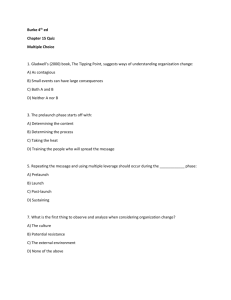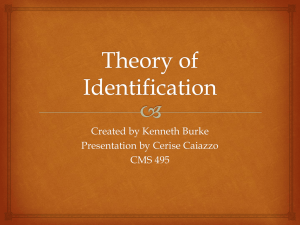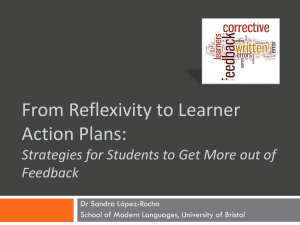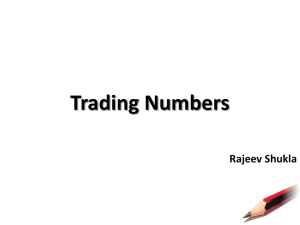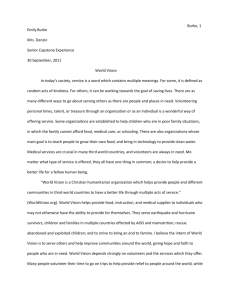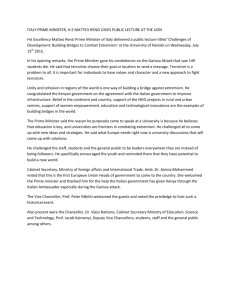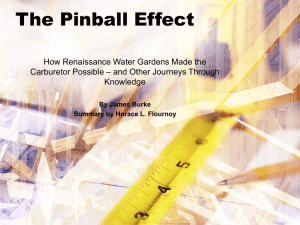Full Text - Canberra IQ
advertisement
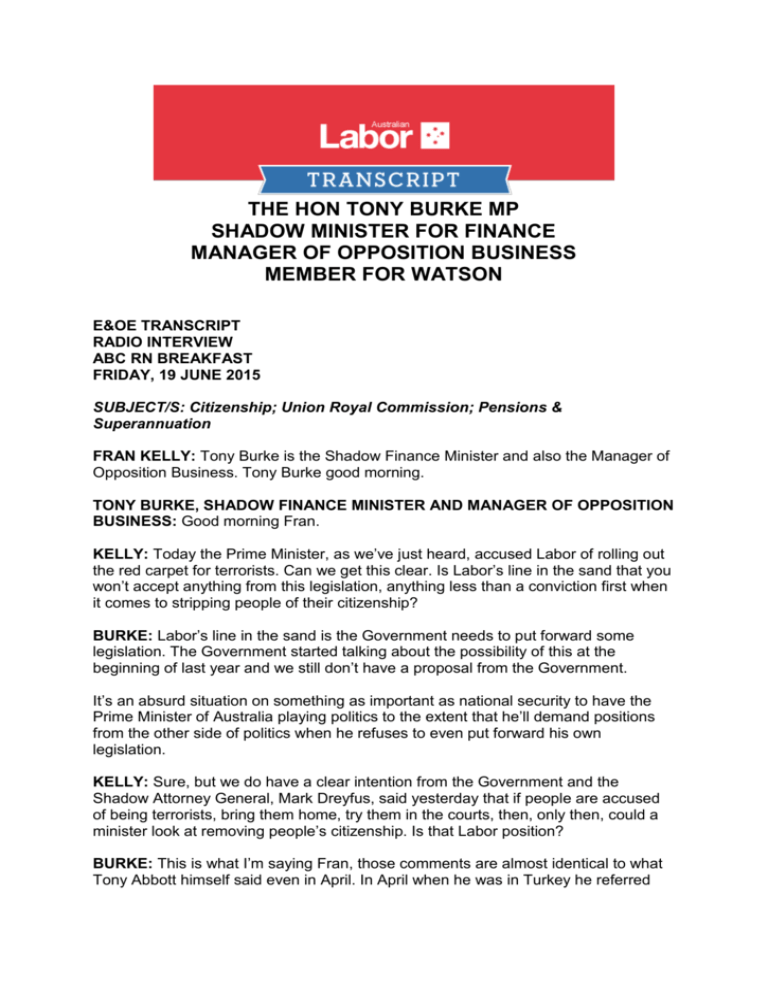
THE HON TONY BURKE MP SHADOW MINISTER FOR FINANCE MANAGER OF OPPOSITION BUSINESS MEMBER FOR WATSON E&OE TRANSCRIPT RADIO INTERVIEW ABC RN BREAKFAST FRIDAY, 19 JUNE 2015 SUBJECT/S: Citizenship; Union Royal Commission; Pensions & Superannuation FRAN KELLY: Tony Burke is the Shadow Finance Minister and also the Manager of Opposition Business. Tony Burke good morning. TONY BURKE, SHADOW FINANCE MINISTER AND MANAGER OF OPPOSITION BUSINESS: Good morning Fran. KELLY: Today the Prime Minister, as we’ve just heard, accused Labor of rolling out the red carpet for terrorists. Can we get this clear. Is Labor’s line in the sand that you won’t accept anything from this legislation, anything less than a conviction first when it comes to stripping people of their citizenship? BURKE: Labor’s line in the sand is the Government needs to put forward some legislation. The Government started talking about the possibility of this at the beginning of last year and we still don’t have a proposal from the Government. It’s an absurd situation on something as important as national security to have the Prime Minister of Australia playing politics to the extent that he’ll demand positions from the other side of politics when he refuses to even put forward his own legislation. KELLY: Sure, but we do have a clear intention from the Government and the Shadow Attorney General, Mark Dreyfus, said yesterday that if people are accused of being terrorists, bring them home, try them in the courts, then, only then, could a minister look at removing people’s citizenship. Is that Labor position? BURKE: This is what I’m saying Fran, those comments are almost identical to what Tony Abbott himself said even in April. In April when he was in Turkey he referred specifically to if people have committed crimes of terrorism, we want to get them into a court and into jail. The whole reason last year we had the foreign fighters legislation was because the position of the Government back then, which had bipartisan support from us, was if there were foreign fighters then they should be convicted and put in jail. Now, if the Government has changed its position from everything they’ve been saying for nearly a year and a half now, then it’s not unreasonable for Labor to say that we want to see the legislation before we come back with a final position. And if there’s – KELLY: That’s not a unreasonable, that’s not what Mark Dreyfus said though. Mark Dreyfus said people need to face a court and be convicted before they can be stripped of their citizenship and the obvious point is how do you do that if someone has been fighting with ISIS in Iraq and Syria, how do you get them home and why would you? The Prime Minister makes the point why would you invite these people back into the country and I think a lot of people think ‘yeah, why would you?’ BURKE: No, no, in fairness Fran the question Mark Dreyfus was answering was quite specifically a journalist asking: If you were to seek a conviction, how would you do that? And Mark Dreyfus said ‘well you have to get them back here’. That is no different at all to what the Prime Minister himself said in April. What we’re seeing here is the Prime Minister distorting words that are almost identical to what his own were only a few months ago for the specific purpose of breaking down bipartisan support on national security, for the specific purpose of playing politics with the safety of Australians, which is what national security is meant to be about, simply for his own political games. This is a fundamental breakdown from how this issue has been dealt with by both sides of politics through consecutive governments for a very long time. We should have, for something as important as this, the normal process; the Government puts forward legislation, the Opposition gets briefed on what the national security implications are and what intelligence information the Government has as to why that legislation is important, and then we work it through sensibly. The political game that this has turned in to from this Prime Minister over the course of the last week, is nothing short of appalling. KELLY: You’re listening to RN Breakfast. Our guest is the Manager of Opposition Business in the House, Tony Burke. It’s 20 minutes to eight. We will get that legislation from the Prime Minister on Wednesday we know now. If I can move on to another issues around this week. Bill Shorten has asked for an early hearing at the Royal Commission into Union Corruption. He’ll have one on July 8. He’ll be facing these allegations of sweetheart deals struck with businesses in exchange for members being signed up. As a former union official yourself, do you believe pay and conditions should ever be sacrificed in exchange for increased union and factional power? BURKE: When you say pay and conditions being sacrificed, obviously the answer to the question you just put is ‘No’. But the thing that needs to be recognised with how some of these distortions are happening, is in any agreement there will be some give and some take as employees and employers reach compromises on what the next stage should be. Often, as has been the case in some of the agreements we’ve seen, it’s for some penalty rates being reduced and some hourly rates being increased. Those sorts of thing can work in different directions, there can be different issues of flexibility. At the end of all of this there are two issues: One, we’re talking about agreements that were agreed by employees, employers and registered in the Industrial Relations Commission with all formal processes and – KELLY: So implied is that the workforce knew and agreed? BURKE: The second thing I want to say is Bill Shorten has dedicated his whole life to representing working people and improving the conditions of working people. That’s why he wants to make sure at the earliest possible opportunity he can get in front of the Royal Commission, which you know it’s been $80 million with terms of reference designed to create a political storm, notwithstanding that, Bill’s saying he wants to front it, he wants to have the chance for them to put the different accusations they want to make so he can set the record straight. I think what we saw yesterday was very telling. When the day began with a media storm about an agreement and half way through the day Tony Shepherd himself came out and referred to the win that Victoria had with infrastructure being put forward, the win that the workers had with improved pay and conditions, the safety record and the success of the project. Now Tony Shepherd doesn’t carry a brief for Labor I think we all know that. KELLY: Sure, but the implication of these, more and more of these cases we’re hearing from the Royal Commission, is that union bosses are doing deals with the employers that somehow end up with money in the union coffers that then ends up or broadening the membership base of union, which ends up strengthening the political base of the individual union leader. Now for decades your union for instance, the shop worker’s SDA, paid major retailers millions of dollars of members money every year so the companies would automatically facilitate the payment of union fees through payroll deductions. This has come before the commission. Were you aware of that practice when you were at the SDA? BURKE: Well no, there’s an administration fee the same as when you have a bank processing something you have an administration fee and nothing more than that and I presume what you’re talking about is a cumulative figure. To refer to that is though it’s somehow some sort of kick back is just – KELLY: Well the implication is that it was a lot of money and it was so the unions could expand their membership base? BURKE: Yeah and the way that’s been argued is simply inaccurate. You would have people who chose to join the union, people who chose to not join the union. I was a local organiser and I was there on shop floors talking to people face to face and helping them through with their workplace problems. This is why Bill Shorten has said he wants to be able to front the commission, to be able to give the calm explanation that the hysteria that the papers are currently running on, just to be able to put that to bed in front of the Royal Commission. Let them put all the accusations at once. This Royal Commission was set up by Tony Abbott for a direct political motivation. That hasn’t changed the fact that Bill Shorten’s still said he’s willing to front up, face every accusation and do it there. KELLY: Just on another issue this week. Some in Labor are unhappy with the position that the Opposition has taken to oppose the Government’s Budget measure of toughening the pension assets test. You’re the Shadow Finance Minister, were you worried that this would be seen as Labor abandoning economic rectitude or this was indeed that? BURKE: Well you need to look behind every measure. Simply the fact that something improves the Budget bottom line on its own isn’t enough. You have to work out who you’re hurting on the way through. Tony Abbott – KELLY: Well what this was going was improving the Budget bottom line for the poorest of pensioners. BURKE: This is the challenge, you can have somebody, under this proposal from the Government, who is on superannuation receiving $25,000 a year. This is not a high income. $25,000 a year in retirement you’re getting from your superannuation, under this proposal they will lose $8,200 of their part pension. That is a big amount of money. KELLY: Yes but if you look behind the proposal as you say these people are only getting that money because they’ve got money in the bank. In a sense the Prime Minister’s right when it’s giving the pension to millionaires. People can always draw down on their savings can’t they? BURKE: Well if we’re in a situation where the view is that people just save for superannuation, put that money there and then run it down rather than being able to have a modest income from the earnings – KELLY: Yeah but not forever. BURKE: I’ve got to say $25,000 is very modest income. If that’s the point at which you’re meant to start drawing down, that means a very poor retirement for most working Australians. Instead, when Labor has put forward, for the highest income people who have earnings of more than $75,000 that they should at least start paying tax on the earning from their superannuation in retirement on each dollar past $75,000. The Government says that’s taking money out of the piggy bank. For heaven’s sake, this is us defending the person who’s only receiving $25,000 a year. KELLY: Tony Burke than you very much for joining us. BURKE: Good to be back. ENDS
